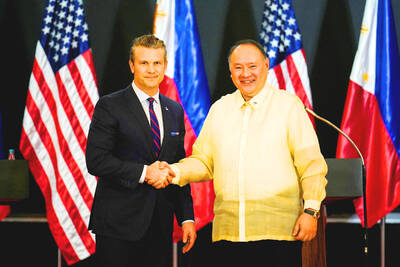Voters in Luxembourg briefly revived the European constitution on Sunday when they strongly endorsed the measure weeks after emphatic "no" votes in France and Holland.
Jean-Claude Juncker, the Luxembourg prime minister who had threatened to resign if the Grand Duchy had voted the same way, emerged triumphant after the constitution was approved by 56.52 percent to 43.48 percent.
As an arch-federalist, Juncker immediately attempted to use the results to keep the debate alive.
"If Luxembourg had said `no' the constitution would have been dead," he declared on Sunday night.
As Luxembourg has said "yes" the process can go ahead. There is a way for the European constitution to be adopted.
"If Luxembourg had said `no,' Europe would have been in an ultra-serious crisis. Now that Luxembourg has voted `yes,' Europe is still in crisis, but there is a silver lining," he said.
The Luxembourg prime minister earlier concluded that French and Dutch "no" votes were not a rejection of the constitution but were motivated by other concerns. On Sunday he appeared to suggest that only Luxembourg has a veto.
However, Jose Manuel Barroso, the president of the European Commission, offered Juncker some hope Sunday night when he hailed the vote as "a strong signal" that most European countries support the constitution.
Every other EU member to have approved the constitution has relied on a parliamentary vote, except for Spain. Barroso balanced his upbeat language by admitting that the future of the constitution is "uncertain."
Choosing his words carefully German Chancellor Gerhard Schroder said: "It is an encouragement and invitation to all Europeans to seek joint ways of quickly overcoming the current crisis."
The remarks reflect the private view of many European leaders who believe it is all but impossible to see how the constitution can survive the double rejection by voters in France and the Netherlands on May 29 and June 1.

‘EYE FOR AN EYE’: Two of the men were shot by a male relative of the victims, whose families turned down the opportunity to offer them amnesty, the Supreme Court said Four men were yesterday publicly executed in Afghanistan, the Supreme Court said, the highest number of executions to be carried out in one day since the Taliban’s return to power. The executions in three separate provinces brought to 10 the number of men publicly put to death since 2021, according to an Agence France-Presse tally. Public executions were common during the Taliban’s first rule from 1996 to 2001, with most of them carried out publicly in sports stadiums. Two men were shot around six or seven times by a male relative of the victims in front of spectators in Qala-i-Naw, the center

Incumbent Ecuadoran President Daniel Noboa on Sunday claimed a runaway victory in the nation’s presidential election, after voters endorsed the young leader’s “iron fist” approach to rampant cartel violence. With more than 90 percent of the votes counted, the National Election Council said Noboa had an unassailable 12-point lead over his leftist rival Luisa Gonzalez. Official results showed Noboa with 56 percent of the vote, against Gonzalez’s 44 percent — a far bigger winning margin than expected after a virtual tie in the first round. Speaking to jubilant supporters in his hometown of Olon, the 37-year-old president claimed a “historic victory.” “A huge hug

Two Belgian teenagers on Tuesday were charged with wildlife piracy after they were found with thousands of ants packed in test tubes in what Kenyan authorities said was part of a trend in trafficking smaller and lesser-known species. Lornoy David and Seppe Lodewijckx, two 19-year-olds who were arrested on April 5 with 5,000 ants at a guest house, appeared distraught during their appearance before a magistrate in Nairobi and were comforted in the courtroom by relatives. They told the magistrate that they were collecting the ants for fun and did not know that it was illegal. In a separate criminal case, Kenyan Dennis

The US will help bolster the Philippines’ arsenal and step up joint military exercises, Manila’s defense chief said, as tensions between Washington and China escalate. The longtime US ally is expecting a sustained US$500 million in annual defense funding from Washington through 2029 to boost its military capabilities and deter China’s “aggression” in the region, Philippine Secretary of Defense Gilberto Teodoro said in an interview in Manila on Thursday. “It is a no-brainer for anybody, because of the aggressive behavior of China,” Teodoro said on close military ties with the US under President Donald Trump. “The efforts for deterrence, for joint resilience